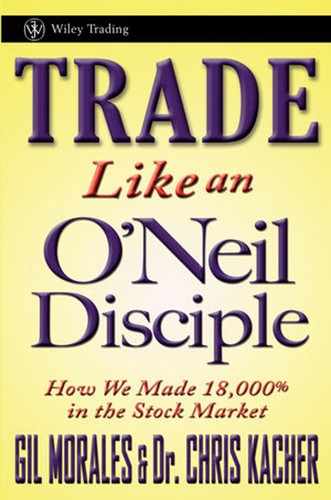8.2. SURVIVING BY KEEPING EGO IN CHECK
With over 50 years of experience, O'Neil is, by sheer definition, a senior survivor of the professional investment business, and in the process he has seen many other professional investors and investment firms come and go. Most of the failures he has witnessed in the investment industry were caused by excessive ego and the dangerous psychological effect that sudden wealth can have on people who have a tendency to simply get carried away with money and themselves. Money is certainly capable of becoming the root of all evil, as it can lead an individual down unsustainable paths of self-indulgence. Because of this, the taste of significant and material success in the markets, as we discussed in Chapter 3, can absolutely be fatal.
With more than 50 years in the business, O'Neil has more than a few stories to tell regarding the lessons of investment excess and folly. We recall several of these stories, such as the one about a broker he knew at Hayden Stone, a smart kid out of Yale who had bought a lot of big-growth stocks in the 1960s like Brunswick and American Photocopy and had made a lot of money, but when they started coming down, he began to proclaim his infallible approach as a newly declared "long-term investor." To put it simply, he rode all these hot stocks all the way up, and he rode them all the way down, and in the process put himself out of business. Another fellow Bill knew as a broker was a guy who borrowed $150,000 (a lot of money in the early 1960s) to leverage himself up into Solotron, a big high-tech glamor stock in the 1960s. The stock hit 275 and topped. He held it all the way down from 275 to 8, losing his job, losing his wife, and having a stroke after going bankrupt. These are lessons about what happens to those blinded by initial success with a stock or in the market in general.
In June of 1999, Bill pointed out the photo of Steve Case, CEO of dot.com wunderkind stock America Online (AOL), which was making the rounds in the financial print media. The photo showed Case coming out of a government building after giving his testimony with respect to antitrust actions the U.S. government was pursuing against Microsoft, Inc. (MSFT). Case had a big, smug smile on his face. Nobody understand human nature as well as Bill O'Neil, in particular when it came to the managements of certain companies who can get carried away as a result of their heady success. O'Neil recognized the tell-tale signs of overconfidence which can lead some top corporate managers to become overextended and full of themselves. O'Neil correctly predicted that AOL's best days were likely behind it, and after making another retest of its highs in late 1999, AOL declined from a high of 267.76 in December of 1999 to 24.31 at the bear market lows in 2002, saving itself from the ignominy of the affair by buying out and changing its name to Time Warner, Inc. in 2000, a move that turned out to be ill-considered but not uncommon for a management that had taken on a false sense of omniscience and omnipotence.
Bill O'Neil's approach to the business has evolved from his perception that in order to survive in this business, and even in life itself, one must maintain perspective and not get carried away with one's success and the trappings of wealth. He understands the pattern of psychology and behavior that ensues after one makes a lot of money in the markets. Once traders find they cannot duplicate this magic wealth creation feat immediately and at will, since it takes a nicely trending market to make such huge gains and thus requires the market's cooperation, they resort to riskier trades, a conversion to "long-term investing" or leveraging schemes to maintain the growth of their wealth and expanding pattern of conspicuous consumption.
In this manner, the organization reflects this ethic. The O'Neil campus where Data Analysis, Inc., Investor's Business Daily, William O'Neil + Company, Inc, O'Neil Securities, Inc., and the other O'Neil sister companies are located is rather modest and Spartan. We used to joke that the big status symbol for one's office at O'Neil was not getting new carpet, but getting new duct tape to repair the rips in your old office carpet! All joking aside, you will not find a Google-like "habitat" where extravagant and self-indulgent perks are an intrinsic part of the environment. You come to work for Bill O'Neil to learn how to make money in the markets, and lots of it, not to get a daily massage or have your laundry done. This frugal behavior is borne from O'Neil's Depression Baby sensibilities as well as an underlying wisdom and long-term understanding of how otherwise rational and successful investors become prey to the various ego and vanity-related psychological pitfalls of the investment business. And it is not as if O'Neil doesn't advise making one's stock market profits real by occasionally rewarding oneself with a new car (just don't make it a Ferrari!) or some other recognition and reinforcement of a successful stock market investing expedition. But balance and modesty are always called for, and the lessons that O'Neil teaches in this regard are lessons that all investors and traders should heed. In many ways, the United States could learn a lesson here as well, since the financial crisis of 2009 was a symptom of the country getting carried away with the unsustainable concept of "liberty and free money for all."
